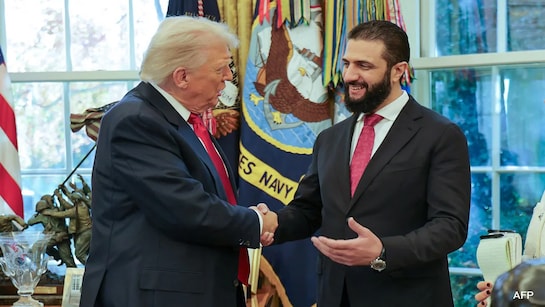One year after toppling Bashar al-Assad and reorienting his war-torn country toward the West, Syria’s new president Ahmed al-Sharaa walked into the White House on Monday for a historic first as a Syrian leader welcomed to Washington.
But just hours later, the rebel-turned-president made clear he isn’t ready to go as far as the Trump administration hopes. In a Fox News interview following his meeting with President Donald Trump, Sharaa said it was “premature” to talk about Syria joining the Abraham Accords, tempering expectations of a dramatic new peace breakthrough.
“We are not going to enter into a negotiation directly right now,” Sharaa said through a translator. “Maybe the United States administration, with President Trump, will help us reach this kind of negotiation.”
The comments were a rare public rebuff to Trump, who has spent months floating the idea of a Syria-Israel normalization deal as the next step in his Middle East peace campaign.
The meeting capped a stunning political reversal for Syria. Barely a year ago, Sharaa was commanding Islamist militias in the country’s northwest, part of a coalition that swept into Damascus and toppled Assad after 14 years of civil war. Since then, Sharaa has sought to pivot his country away from Iran and Russia and toward Washington, Ankara, and the Gulf.
Trump, eager to claim another foreign policy win in the region, has embraced the new leader by lifting sanctions, delisting Sharaa from the U.S. terror watchlist, and inviting him to Washington just months after their first meeting in Saudi Arabia.
“We want to see Syria become a very successful country, and I think this leader can do it,” Trump told reporters in the Oval Office. “He’s had a rough past — we’ve all had rough pasts — but he’s tough, and he gets along very well with President [Recep Tayyip] Erdogan.”
Still, Sharaa’s comments Monday underscored the fragile reality of Syria’s transition: a country still riven by sectarian bloodshed, a leadership still distrusted by Israel, and a population wary of foreign promises.
Security was the primary focus of Sharaa’s talks in Washington, amid quiet U.S. efforts to broker a security pact between Israel and Syria. Israeli forces have maintained limited positions in southwestern Syria since Assad’s fall, in what Jerusalem describes as a “temporary stabilization measure.”
American officials see the talks as a pathway toward future normalization, but the obstacles remain steep. Israel continues to view Sharaa, a former al-Qaeda commander, with deep suspicion, even as Washington insists he has renounced extremism.
“Syria is no longer looked at as a security threat,” Sharaa told Fox News. “It is now looked at as a geopolitical ally… a place where the United States can have great investments, especially extracting gas.”
Those remarks are part of a broader campaign to cast Sharaa as a reformer intent on rebuilding Syria’s shattered economy and opening the country to foreign investment. The World Bank estimates the cost of reconstruction at over $200 billion.
The White House meeting came just days after the Treasury Department suspended most U.S. sanctions on Syria for 180 days, marking the deepest thaw in bilateral relations since the civil war began. The suspension stops short of a full repeal of the Caesar Sanctions Act, which still requires congressional approval.
Trump has pressed lawmakers to act before year’s end, calling Sharaa “a new kind of Syrian leader.” But divisions persist on Capitol Hill. Some Republicans want conditions attached to any repeal, while Democrats like Senator Jeanne Shaheen have proposed lifting the sanctions unconditionally to speed economic recovery.
Even as Sharaa celebrated his diplomatic milestone, reminders of Syria’s volatility trailed him to Washington. Hours before his meeting with Trump, security officials revealed that two Islamic State assassination plots targeting the Syrian president had been foiled in recent months.
The revelation highlighted the precarious security landscape still confronting Sharaa’s government. Over the weekend, Syrian forces arrested more than 70 suspected ISIS operatives in nationwide raids.
Analysts say those threats, coupled with lingering unrest among minority communities, have made the new regime hesitant to move too fast on sensitive issues like peace with Israel.
For Trump, the Sharaa visit fits neatly into a larger post-Gaza strategy — pairing the maintenance of a U.S.-brokered ceasefire between Israel and Hamas with efforts to expand the Abraham Accords and strengthen ties with Sunni powers.
Behind the scenes, Jared Kushner has reemerged as a key player, shuttling between Jerusalem and Gulf capitals. According to Saudi outlet al-Hadath, Kushner met with Israeli Prime Minister Benjamin Netanyahu on Monday to discuss both Gaza and Syria. Netanyahu reportedly urged the U.S. to press Damascus on a security framework that could pave the way for eventual normalization.
Trump hinted at future developments, telling reporters after the meeting: “You can expect some announcements on Syria soon.”
(YWN World Headquarters – NYC)












2 Responses
Hoping for the best, however, not much of a track record in that direction. Why does he complain about the Golan Heights, especially after Pres. Trump recognized they belong to Israel? Why are his soldiers allowing armaments to reach Lebanon? Why is he attacking minorities, particularly those with ties to Israel? It is certainly better that he is aligning with Turkey in place of Iran and Russia, yet it doesn’t help that Turkey and Israel are not good allies currently, nor has the Brotherhood been ousted. It seems like he’s playing for time and money.
What happened with returning the body of Eli Cohen?